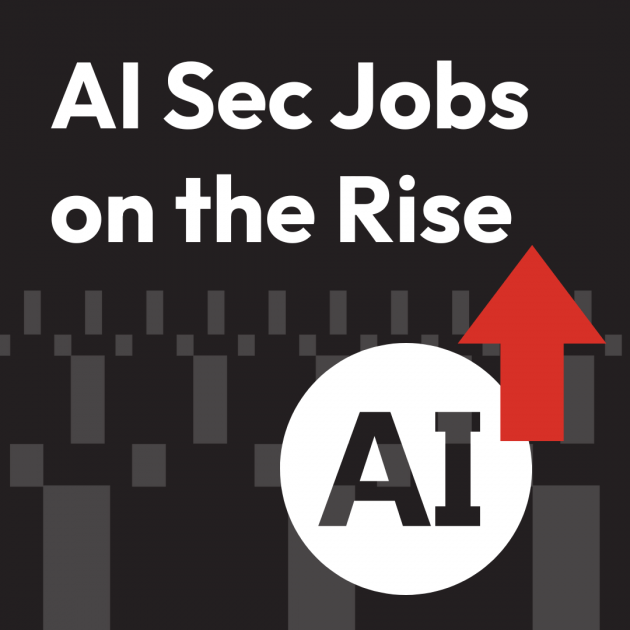The Rise of AI Security Careers

The rapid adoption of artificial intelligence across industries has created an unprecedented demand for cybersecurity professionals who understand both AI systems and their unique vulnerabilities. Organizations feel pressured to fill specialized roles that didn’t exist five years ago, creating exceptional career opportunities for security professionals ready to evolve with the technology landscape.
As AI becomes deeply embedded in business operations—from automated customer service to predictive analytics—new attack vectors emerge from AI that traditional security measures can’t address. This shift predicts a job market bump for AI security, with salaries ranging from $90,000 to over $300,000 for specialized roles.
What’s Driving the AI Security Job Market?
AI systems face unique threats like model poisoning, adversarial attacks, and data manipulation that require specialized knowledge to defend against.
New Attack Vectors Create New Needs
AI systems introduce attack surfaces that don’t exist in conventional software. Threat actors can manipulate machine learning models through poisoned training data, fool AI systems with carefully crafted inputs, or extract sensitive information through model behavior analysis. These sophisticated attacks require defenders who understand both cybersecurity principles and AI system architecture.
Regulatory Pressure Accelerates Demand
Legislation like the EU AI Act and growing compliance requirements are pushing organizations to hire AI security specialists. Companies need professionals who can navigate complex regulatory frameworks while implementing practical security measures for AI systems.
According to ISC2’s 2024 Global Workforce Study, 82% of cybersecurity professionals report that AI improves their efficiency, yet 56% believe AI will make portions of their current roles obsolete. The feelings from that 56% may not come to fruition, but it’s clear that professionals who combine traditional security knowledge with AI expertise will be in highest demand.
Five High-Demand AI Security Roles
The AI security job market has created distinct career paths, each requiring specific skill combinations:
- AI Security Analysts: serve as frontline defenders, monitoring machine learning systems for anomalies while using AI tools to enhance traditional threat detection. They analyze behavioral patterns in AI systems, investigate AI-generated alerts, and fine-tune detection models. Salaries range from $90,000 to $150,000 annually.
- Machine Learning Security Engineers design and build secure AI systems from the ground up. They create neural networks for threat detection, develop algorithms for real-time security monitoring, and ensure ML pipeline security. This highly technical role commands $152,000 to $205,000 annually, with top performers earning up to $300,000.
- AI Incident Response Specialists handle crises when AI systems are compromised. They investigate model manipulation attempts, analyze adversarial attacks, and develop response playbooks for AI-specific incidents. Their critical role in crisis management drives salaries between $120,000 and $180,000 annually.
- AI Governance and Compliance Attorneys ensure AI systems meet regulatory requirements while maintaining security standards. This emerging legal specialty has seen 41% job growth from 2023 to 2024, with recent graduates earning $235,000 to $260,000 in major markets.
- AI Risk Management Specialists quantify business risks of AI deployment, developing frameworks to assess everything from model bias to adversarial attacks. They bridge technical AI knowledge with business strategy, earning $130,000 to $190,000 annually.
Essential Skills for AI Security Professionals
Breaking into AI security requires a combination of traditional cybersecurity knowledge and specialized AI expertise:
- Technical Foundation: Python programming, machine learning algorithms, and experience with AI frameworks like TensorFlow or PyTorch form the core technical requirements. Understanding statistical analysis and data science principles is increasingly valuable.
- Security Expertise: Traditional cybersecurity skills remain crucial. Knowledge of encryption, network security, digital forensics, and incident response provides the foundation for AI-specific security work.
- AI-Specific Knowledge: Understanding adversarial machine learning, model vulnerabilities, and AI system architectures distinguishes AI security professionals from traditional cybersecurity roles. Familiarity with tools like Foolbox for adversarial testing or SHAP for model explainability demonstrates specialized expertise.
- Regulatory Understanding: Knowledge of emerging AI regulations, compliance frameworks like GDPR and CCPA, and ethical AI principles helps organizations navigate the complex regulatory landscape.
Why Traditional Security Knowledge Still Matters
While AI security introduces new challenges, traditional cybersecurity principles remain foundational. Network security, access controls, and incident response procedures apply to AI systems just as they do to conventional applications. Experienced security professionals shouldn’t abandon their existing knowledge—they should build upon it.
The most successful AI security professionals combine deep traditional security knowledge with AI-specific expertise, creating a hybrid skill set that addresses both conventional and emerging threats.
The Risk of Overlooking Experience
Organizations rushing to adopt AI security may be tempted to prioritize AI knowledge over traditional security experience. This approach portends significant risks.
Experienced security professionals bring institutional knowledge about threat patterns, incident response procedures, and risk assessment that remains valuable in AI contexts. They understand how attackers think and operate, knowledge that applies regardless of the underlying technology.
Replacing experienced security talent entirely with AI-focused newcomers can leave organizations vulnerable to basic security failures while focusing on sophisticated AI threats. The most effective approach combines experienced security professionals with AI training rather than wholesale replacement.

Building Your AI Security Career Path
For security professionals looking to transition into AI security, the path forward is clear but requires commitment to continuous learning.
Start with foundational AI knowledge through online courses or certifications in machine learning and data science. Practice with AI frameworks and tools to understand how these systems operate. Join communities like OWASP AI Exchange or the AI Village at DEF CON to network with peers and stay current on emerging threats.
Most importantly, don’t abandon your existing security expertise. The combination of traditional security knowledge with AI specialization creates the most valuable and marketable skill set in this rapidly evolving field.
Sources:
https://www.cybrsecmedia.com/ai-security-job-boom-new-roles-cyber-threats
https://www.huntress.com/cybersecurity-101/topic/ai-security-specialist










